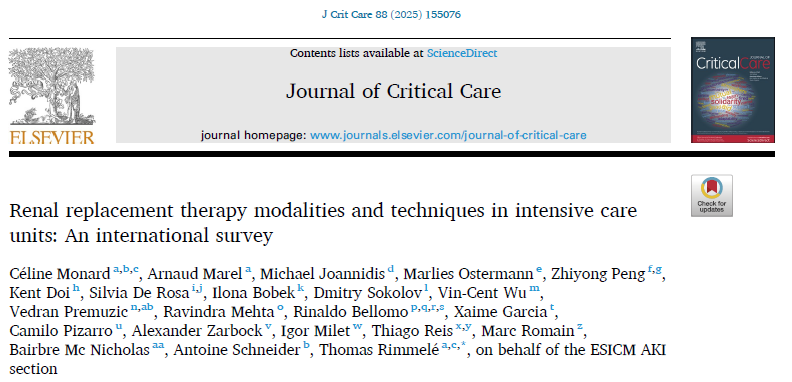Renal replacement therapy modalities and techniques in intensive care units: An international survey

New published ESICM AKI Paper
The ESICM AKI Section has released results from a major international survey, shedding light on how Renal Replacement Therapy (RRT) is delivered to critically ill patients worldwide—and revealing key trends, variations, and gaps in practice. Conducted between July 2021 and March 2022, the survey collected insights from 1,174 intensive care clinicians across 73 countries, marking one of the most comprehensive snapshots of global RRT practices to date.
🔹 Key findings:
-
Continuous Renal Replacement Therapy (CRRT) is now the most widely available and preferred modality in ICUs, with 97% of respondents reporting access.
-
CVVHDF (continuous veno-venous hemodiafiltration) emerged as the most commonly used technique, followed by CVVHD and CVVH.
-
Regional Citrate Anticoagulation (RCA) is the predominant anticoagulation method for CRRT, cited by over 60% of respondents.
🔹 Modality preferences by clinical scenario:
-
CRRT is strongly preferred in cases of septic shock, fluid overload, and acute brain injury, reflecting concerns over hemodynamic stability.
-
IHD (Intermittent Hemodialysis) remains the modality of choice for rehabilitation, intoxication, and where cost or staffing are limiting factors.
🔹 Practice variation and knowledge gaps:
-
The survey revealed wide variation in how RRT is delivered, including differences in filtration settings and solute clearance goals. Only about 50% of ICUs have formal RRT protocols in place.
-
This survey revealed an evolving landscape of RRT practices worldwide, with an increase in CVVHD and regional citrate anticoagulation use.
🔹 Call to action:
The findings underscore the need for:
-
Comparative clinical trials on RRT modalities and techniques
-
Standardised international protocols
-
Increased training and education for ICU teams
As acute kidney injury continues to impact outcomes in the ICU, this global survey represents an important step toward aligning practice with evidence and improving care for critically ill patients.